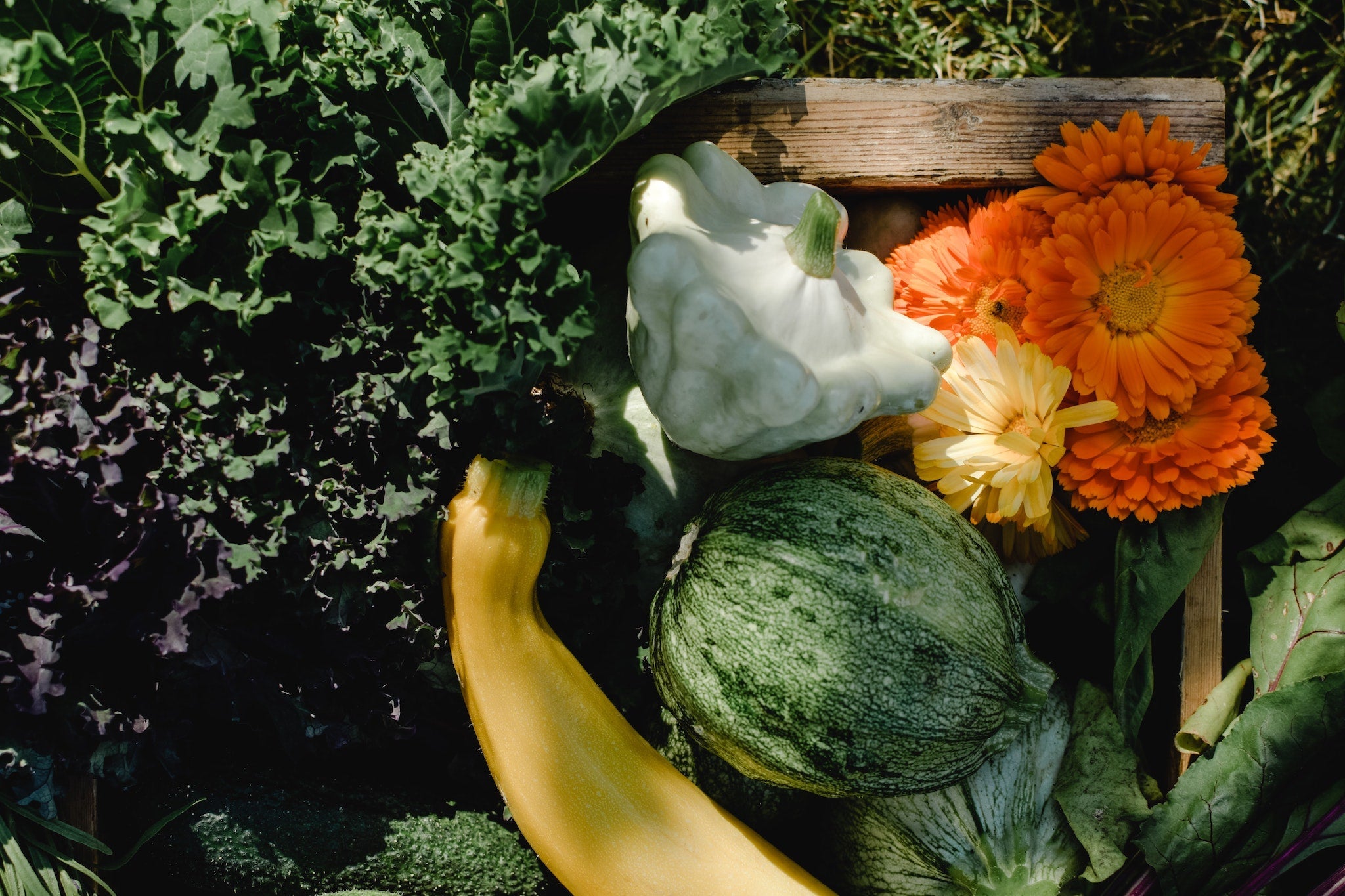
Pitta Balancing Foods List
When a dosha, be it vata, pitta or kapha, is out of balance, Ayurveda explains that first and foremost one must assess the health and strength of the digestive system in order to regain balance and bring health and harmony back to both the physical body and emotional mind. The reason why much emphasis is placed on the health of the digestive system is that everything one consumes is broken down, absorbed and assimilated into the building blocks which become the tissues of the physical body as well as the vibrational frequency of the energetic body. Thus, when one is eating prana-rich, nutrient-dense foods that are grown organically and appropriate for one’s dosha, the digestive system is able to easefully do its job and the body’s tissues are formed in optimal health, allowing them to support a strong physical body and a well-balanced mind.
We have previously shared with you a Vata Balancing Foods List and a Kapha Balancing Foods List and now that it is summertime in the Northern Hemisphere and the heat of pitta is on, we would like to support you with a Pitta Balancing Foods List. You may notice as you read through the list that there is an emphasis on foods and spices that are cooling, heavy, dense, mild and slightly dry. This is because these qualities counterbalance the hot, sharp, light and slightly oily properties contained within pitta dosha. Further, the astringent, bitter and sweet tastes are recommended to balance pitta dosha when it is in excess, while the pungent, sour and salty tastes are less advised as they can increase the heat of already fiery pitta dosha.
Additionally, in order to learn more about Ayurveda and how it pertains to you and your being, we encourage you to take your wellness journey to the next level by downloading our Introduction to Ayurveda Class or booking an Ayurvedic consultation with our Clinical Ayurvedic Specialist, Laurel Odom.
Oils
When working to balance excess pitta dosha, it is best to avoid heating oils like sesame and almond and also avoid heating and light oils like safflower, mustard and corn. Instead, opt for oils that are both cooling and heavy. Since pitta is slightly oily in nature, a moderate amount of oil is recommended.
Best Oils for Pitta
Coconut
Sunflower
Olive
Ghee

Spices
Spices are essential for optimal digestion as they help to kindle agni (digestive fire) and prepare the gastrointestinal tract for the intake, absorption and assimilation of food. Spices that are more cooling in nature that gently stimulate agni are best for pitta dosha while the super hot, pungent spices like cayenne, mustard, asafoetida and dry ginger are best avoided. In Ayurveda, there are various ways to incorporate spices into one’s diet. For example, a classic Ayurvedic method of ingesting spices is through a digestive churna (powdered herbs blended with water). Additionally, spices can of course be added directly into snacks and meals. For a simple way to incorporate pitta balancing spices, try our Pitta Spice Blend! It is an excellent cooking companion and is designed by Ayurvedic herbalists to stimulate agni, support healthy pitta type digestion and soothe and cool excess pitta dosha.
Best Spices for Pitta
Coriander
Cumin
Fennel
Cardamom
Peppermint
Spearmint
Turmeric
Dill
Saffron
Tarragon
Vegetables
When selecting pitta pacifying vegetables, favor ones that are cooling, astringent, bitter, heavy and grounding while avoiding hot and spicy vegetables like chilis, raw onions and garlic. We recommend steaming vegetables when you can as it helps to retain the water content and moisture of vegetables, which is ideal when working to cool down the fiery nature associated with pitta. Finally, since pitta dosha contains the fire element, people that are predominant in pitta dosha or are experiencing an increase in pitta dosha are best able to digest raw foods since agni (digestion) is generally strong. Thus, raw veggies can be enjoyed by these individuals in the summer months; however, Ayurvedic principles explain that cooked vegetables are best for the rest of the year.

Best Vegetables for Pitta
Kale
Dandelion greens
Collard greens
Lettuce
Cucumber
Cilantro
Bok choy
Wheatgrass
Asparagus
Green beans
Spinach
Okra
Broccoli
Cauliflower
Artichoke
Celery
Watercress
Jicama
Alfalfa sprouts
Bean sprouts
Brussels sprouts
Cabbage
Summer squash
Zucchini
Tomatoes* (fresh & ripened)
Beets (cooked)
Carrots*
Sweet potato*
Acorn squash*
Butternut squash*
Pumpkin*
Spaghetti squash*
Corn (fresh)*
*in moderation
Grains
In Ayurvedic medicine, grains are understood to strengthen and fortify the body. Containing the sweet taste, many grains are balancing to pitta dosha. Cooling, dry and grounding grains are best for pitta while heating grains like buckwheat and rye are best avoided.

Best Grains for Pitta
White Basmati rice
Wheat
Whole wheat
Barley
Amaranth
Quinoa
Oats (cooked)
Granola
Spelt
Durham flour
Beans & Legumes
Beans and legumes have heavy and dry qualities which can help absorb the oiliness sometimes associated with pitta dosha; hence, there is a plentiful selection that one can enjoy while balancing pitta. Please keep in mind that you want your beans and legumes to be well cooked and spiced to best support optimal absorption, assimilation and digestion of this astringent food group.

Best Beans & Legumes for Pitta
Mung beans
Aduki beans
Black lentils
Chickpeas
Split peas
Soybeans
Tofu
Black beans
Black eyed peas
Kidney beans
Red lentils
Brown lentils
Lima beans
Navy beans
White beans
Pinto beans
Meat & Eggs
In Ayurvedic medicine, meat is solely recommended for healing purposes or when there are no other food options available. Thus, meat is indicated when someone is severely depleted, weak and/or convalescing. Further, meat and eggs are generally recommended in Ayurvedic medicine when one is experiencing a vata, pitta or vata/pitta imbalance. This means that meat and eggs are not recommended to pacify kapha dosha as they are too sweet, dense and moist. Please note that Ayurvedic medicine understands that white meat and freshwater meat is best for pitta dosha as these meats are considered heavy and cooling whereas dark meat and saltwater meat are considered too heating for pitta.

Best Meats & Eggs for Pitta
Egg whites
Chicken (white meat)
Turkey (white meat)
Venison
Fish (freshwater)
Buffalo
Rabbit
Dairy & Nut Milks
Dairy and nut milks are generally grounding, nourishing and cooling, making this food category supportive to pitta dosha. Despite this fact, there are some heating and sour dairy products like processed yogurt, buttermilk and sour cream that are best avoided when working to pacify pitta. If selecting dairy products, Ayurveda recommends choosing products that are fresh and unprocessed to best support easy digestion and the intake of prana (life force energy). Since hard cheeses need to be aged for 6 months or more, Ayurveda does not consider hard cheeses like parmesan or sharp cheddar to have much prana. Additionally, hard cheeses clog the nadis, the channels in which prana flows in the subtle body; thus, Ayurveda does not recommend hard cheeses for any of the doshas. In contrast, soft cheeses are considered fresh and sattvic (harmonious) in Ayurvedic nutrition. Dairy is best enjoyed slightly warm because cold dairy products like a chilled glass of milk can reduce or completely put out one’s agni, disrupting the natural flow of digestion. If consuming dairy, it is also best to have it at least one hour away from meals and with spices to support optimal digestion, assimilation and absorption.
Best Dairy & Nut Milks for Pitta
Cottage cheese
Ghee
Cheese (soft, unsalted & unaged)
Cream cheese
Goat cheese (unsalted & unaged)
Yogurt (freshly made)
Cow’s Milk
Coconut milk
Soy Milk
Rice Milk
Nuts & Seeds
Renowned Ayurvedic physician, Dr. Vasant Lad recommends that all doshas consume nuts in small quantities, as they can be difficult to digest. Additionally, when pacifying pitta, one may choose to eliminate nuts completely from the diet because of their heating and oily properties. Instead favor seeds in small amounts as they are more cooling and dry.

Best Nuts & Seeds for Pitta
Coconut
Sunflower seeds
Pumpkin seeds
Charole
Almonds (soaked & peeled)
Fruits
In Ayurvedic medicine, fruits are considered to be purifying due to their light and etheric nature, but they can also be incredibly juicy and sweet. Pitta balancing fruits are the ones that are just that- juicy, sweet and water-dense. It is best to avoid tart, sour and heating fruits like sour oranges, grapefruit and cranberries. In accordance with proper Ayurvedic food combining, always consume fruits away from meals, enjoying them separately as a snack.

Best Fruits for Pitta
Strawberries
Blueberries
Blackberries
Raspberries
Peaches
Mango
Nectarines
Grapes
Cantaloupe
Watermelon
Honeydew melon
Lemons
Limes
Figs
Apples (sweet)
Cherries (sweet)
Apricots (sweet)
Sugars / Sweeteners
As you might have guessed, sugars contain the sweet taste; hence, pitta can benefit from unprocessed sugars in their most natural form. This means that refined white sugar is not supportive to pitta dosha nor any of the other doshas. Instead of adding refined sugar to your baking and/or beverages, we suggest opting for natural sweeteners that still have the sweet taste but also contain a cooling energy, making them pacifying to pitta dosha.

Best Sugars / Sweeteners for Pitta
Maple syrup
Sucanat
Turbinado
Date sugar
We hope that you enjoy incorporating these pitta friendly foods into your meals! Please keep in mind that this list is merely a starting off point to begin with, but that ultimately it is most important to listen to your body and your gut to see what is best for you. Pay attention to any digestive disturbances that you may experience when eating certain foods. Keeping a food journal can be a great way to assess what does and does not work for you and your digestive system. Also, if you are not currently working to balance a particular dosha, then it is recommended to eat in alignment with the seasons.
More for Balancing Pitta
CSA Box Photo by Eva Bronzini: https://www.pexels.com/photo/kale-squash-zucchini-patty-pan-and-flowers-5503188/
Coconut Oil Photo by Dana Tentis: https://www.pexels.com/photo/clear-glass-container-with-coconut-oil-725998/
Kale Photo by Eva Bronzini: https://www.pexels.com/photo/close-up-shot-of-chopped-kale-on-a-wooden-chopping-board-5755942/
Basmati Rice Photo by Maddy Freddie: https://www.pexels.com/photo/wooden-spoon-with-rice-grains-in-heap-7851798/
Chickpea Photo by Marina Leonova: https://www.pexels.com/photo/close-up-shot-of-chickpeas-7717474/
Cracked Egg Photo by Klaus Nielsen: https://www.pexels.com/photo/woman-pouring-white-from-cracked-chicken-egg-6294142/
Pumpkin Seed Photo by João Jesus: https://www.pexels.com/photo/green-seeds-in-blue-bowl-1080071/
Strawberries Photo by David J. Boozer: https://www.pexels.com/photo/strawberry-close-up-photo-1125122/
Maple Syrup Photo by Nicola Barts : https://www.pexels.com/photo/person-holding-a-spoon-and-a-glass-jar-of-honey-7936722/




5 comments
Very informative. I will make some changes to my diet.
Sharon
@Carol Following a pitta balancing foods list may be beneficial. We highly recommend consulting a healthcare provider if there is chronic loose stools and/or diarrhea.
PAAVANI Ayurveda
Thank you for this article, it’s very helpful to me.
Archana
What would be best for a two year old Pitta with loose bowels?
Carol
Happy to have found this site!
Kappé Rousseau
Leave a comment
This site is protected by hCaptcha and the hCaptcha Privacy Policy and Terms of Service apply.